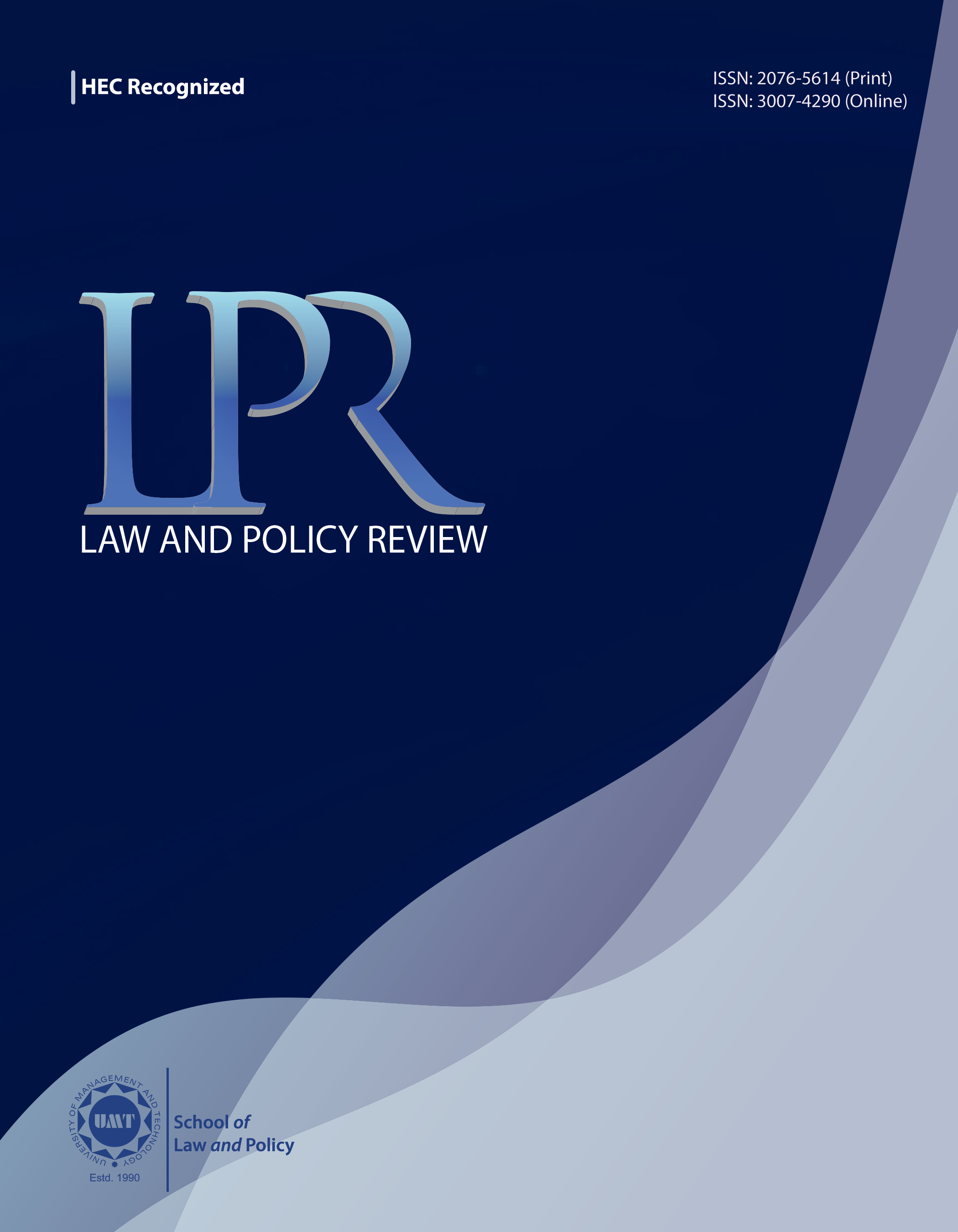Inheritance Rights of Orphaned Grandchildren under Section 4 of Muslim Family Law Ordinance, 1961 and its Alternative Solutions
Abstract
 Abstract Views: 0
Abstract Views: 0
Islamic law of inheritance has extensively explained the entitlement and shares of different legal heirs in the estate of the deceased person. The shares of heirs are fixed and Allah Almighty knows its wisdom. Humans cannot meticulously comprehend its logic. For inheriting the share in the estate of propositus, the heir must be in nearer degree to the deceased person and must be alive at the time of the opening of the succession. However, heirs who are in distant relation to the deceased and also who are not alive upon the demise of the deceased are excluded from inheritance. In the classical law of inheritance, children of predeceased son/daughter (i.e., grandchildren) do not inherit any share from the estate of propositus if the direct children (sons or daughters) of the deceased are still alive. Therefore, for the protection of the inheritance rights of orphaned grandchildren, Section 4 of the Muslim Family Laws Ordinance 1961(hereinafter MFLO) was enacted. Section 4 grants a share to orphaned grandchildren under the principle of representational succession. This provision of law deviates from the traditional scheme of inheritance. Finally, in the case of Allah Rakha v. Federation of Pakistan (2000), the Federal Shariat Court declared it an un-Islamic provision of law. This article explores the place of orphaned grandchildren in the classical Islamic law of inheritance. It also examines the representational succession under Section 4 along with its different alternatives. This article concludes that Section 4 is a controvertible provision and its judicial construction is also multiplicate. Therefore, it is the responsibility of the state to devise welfare schemes for redressing the economic grievances of orphaned grandchildren.
Downloads
References
Abbasi, M. Z., & Cheema, S. A. (2018). Family laws in Pakistan. Oxford University Press.
Abdul Majeed v. Additional District Judge, Faisalabad, PLD Lahore 445 (2012).
Ahmad, A. (2022). A research review of orphan grandson’s inheritance in the light of Sharia and Pakistani law. Al-Absar-Research Journal of Fiqh & Islamic Studies, 1(1), 69–86.
Ahmad, K. (1959). Marriage commission report x-rayed. Chiragh-e-Rah Publications.
Allah Rakha v. Federation of Pakistan, PLD FSC 01 (2000).
Anderson, J. N. D. (1965). Recent reforms in the Islamic law of inheritance. The International and Comparative Law Quarterly, 14(2), 349–365.
Carroll, L. (2002). The Pakistan federal Shariat court, section 4 of the Muslim family laws ordinance, and the orphaned grandchild. Islamic Law and Society, 1(9), 70–82.
Cheema, S. A. (2017). Islamic law of inheritance: Practices in Pakistan. Shariah Academy.
Cheema, S. A. (2023). Section 4 of Muslim family laws ordinance 1961, Pakistan: An exploration of interpretive tensions. SSRN. https://papers.ssrn.com/sol3/papers.cfm?abstract_id=4388281
Chowdhury, A. B. M. S. A. (1964). The problem of representation in the Muslim law of inheritance. Islamic Studies, 3(3), 375–391.
Coulson, N. J. (1971). Succession in the Muslim family. Cambridge University Press.
Faruki, K. (1965). Orphaned grandchildren in Islamic succession law: A comparison of modern Muslim solutions. Islamic Studies, 4(3), 253–274.
Fatima, H. (2024a). A critical appraisal of obligatory bequest as prevalent in Muslim countries. Islamic Studies, 63(2), 213–240. https://doi.org/10.52541/isiri.v63i2.3071
Fatima, H. (2024b). Succession rights of orphaned grandchildren in Pakistan: An examination of prospective or retrospective application of section 4 of Muslim family laws ordinance, 1961 by Pakistani courts. Legal Transformation in Muslim Societies, 1(2), 32–50.
Haji Nizam Khan v Additional District Judge Layallpur, PLD Lahore 930 (1976).
Huq, A.W. M. A. (2010). Section 4 of the Muslim family laws ordinance, 1961: A critic. The Northern University Journal of Law, 1, 7–13.
Khan, H. (2007). The Islamic law of inheritance. Oxford University Press.
Mohmand, K., & Asfandyar, M. (2018). Inheritance rights of orphaned grandchildren: A straightforward provision of law. LUMS Law Journal, 5, 61–71.
Mst. Farishta v. Federation of Pakistan, PLD Peshawar 47 (1980).
Mulla, D. F., Hidayatullah, M., & Ahmed, M. K. (1968). Principles of Muhammadan law. PLD Publishers.
Munir, M. (2018). The share of orphaned grandchildren under Islamic law and Pakistani legal system: A re-evaluation of representational succession in section 4 and its (Mis)interpretation by courts. The Asian Yearbook of Human Rights and Humanitarian Law, 2, 95–116.
Philwari, J. M. (1959). Ijtihadi massaiel (in Urdu). Idarae Saqafate Islamiya.
Powers, D. S. (1993). The Islamic inheritance system: A socio-historical approach. Arab Law Quarterly, 8(1), 13–29.
Rahman, M. H. (1986). Problems for orphaned grandchildren in succession: A study of suggestions. Islamic Studies, 25(2), 211–226.
Rahman, M. H., Monawer, A. T. M., & Usmani, N. M. (2020). Wasiyyah wajibah in Islamic estate planning: An analysis. Journal Islam dan Masyarakat Kontemporari, 21(3), 72–86. https://doi.org/10.37231/jimk.2020.21.3.448
Saikhu, R. A. (2024). Zakat exemptions under Pakistani law: An analysis of case laws. Law and Policy Review, 3(1), 78–97. https://doi.org/10.32350/lpr.31.04
Ullah, D. I. (2018). Muslim family law ordinance section 4, Inheritance of grandson in the light of Islamic teachings. Islamabad Islamicus, 1(1), 81–105.
Usmani, M. T. (1963). Hamaray aaili masail (in Urdu). Darul Ashayat.
Copyright (c) 2024 Haseeb Fatima Saikhu

This work is licensed under a Creative Commons Attribution 4.0 International License.
LPR follow an open-access publishing policy and full text of all published articles is available free, immediately upon publication of an issue. The journal’s contents are published and distributed under the terms of the Creative Commons Attribution 4.0 International (CC-BY 4.0) license. Thus, the work submitted to the journal implies that it is original, unpublished work of the authors (neither published previously nor accepted/under consideration for publication elsewhere). On acceptance of a manuscript for publication, a corresponding author on the behalf of all co-authors of the manuscript will sign and submit a completed the Copyright and Author Consent Form.





